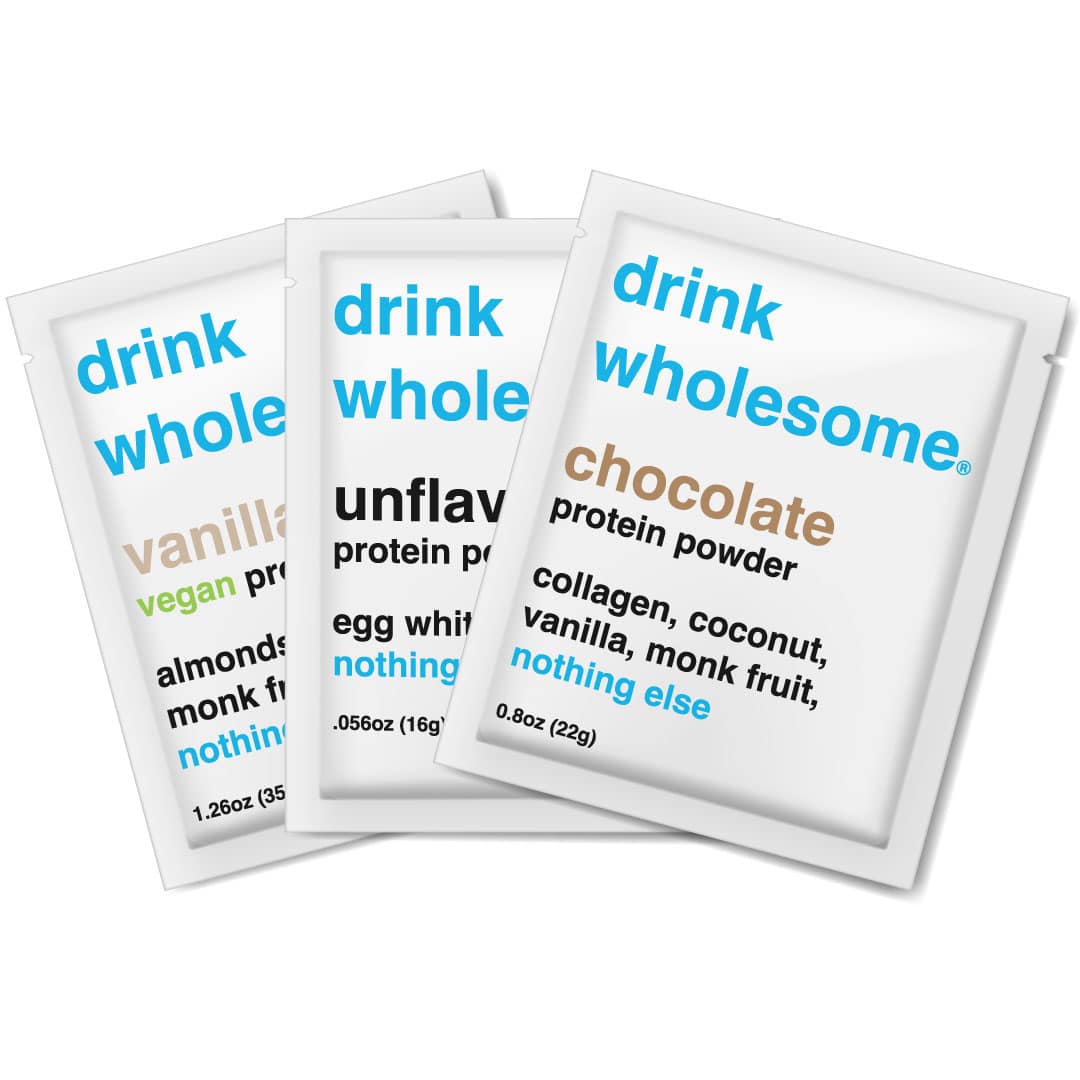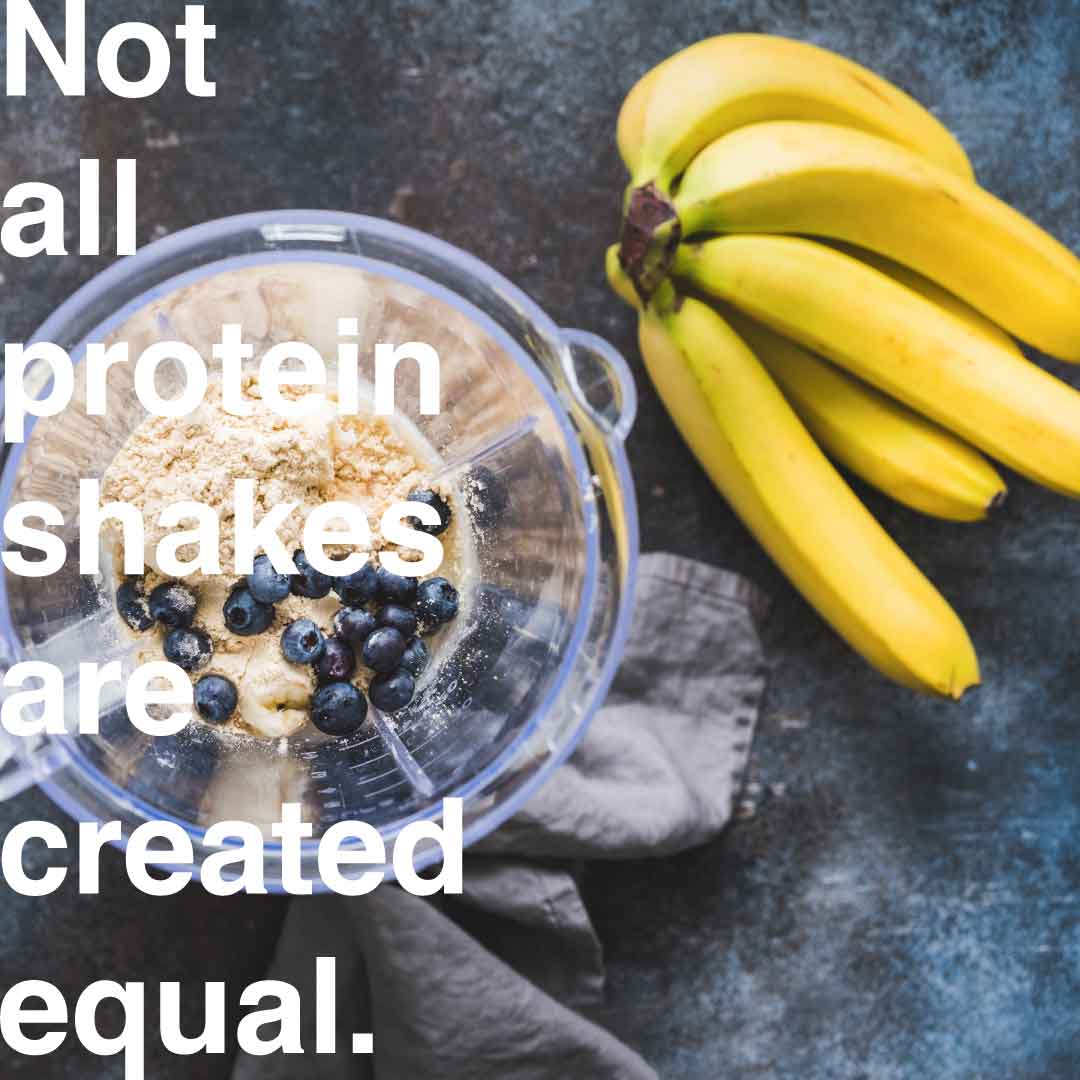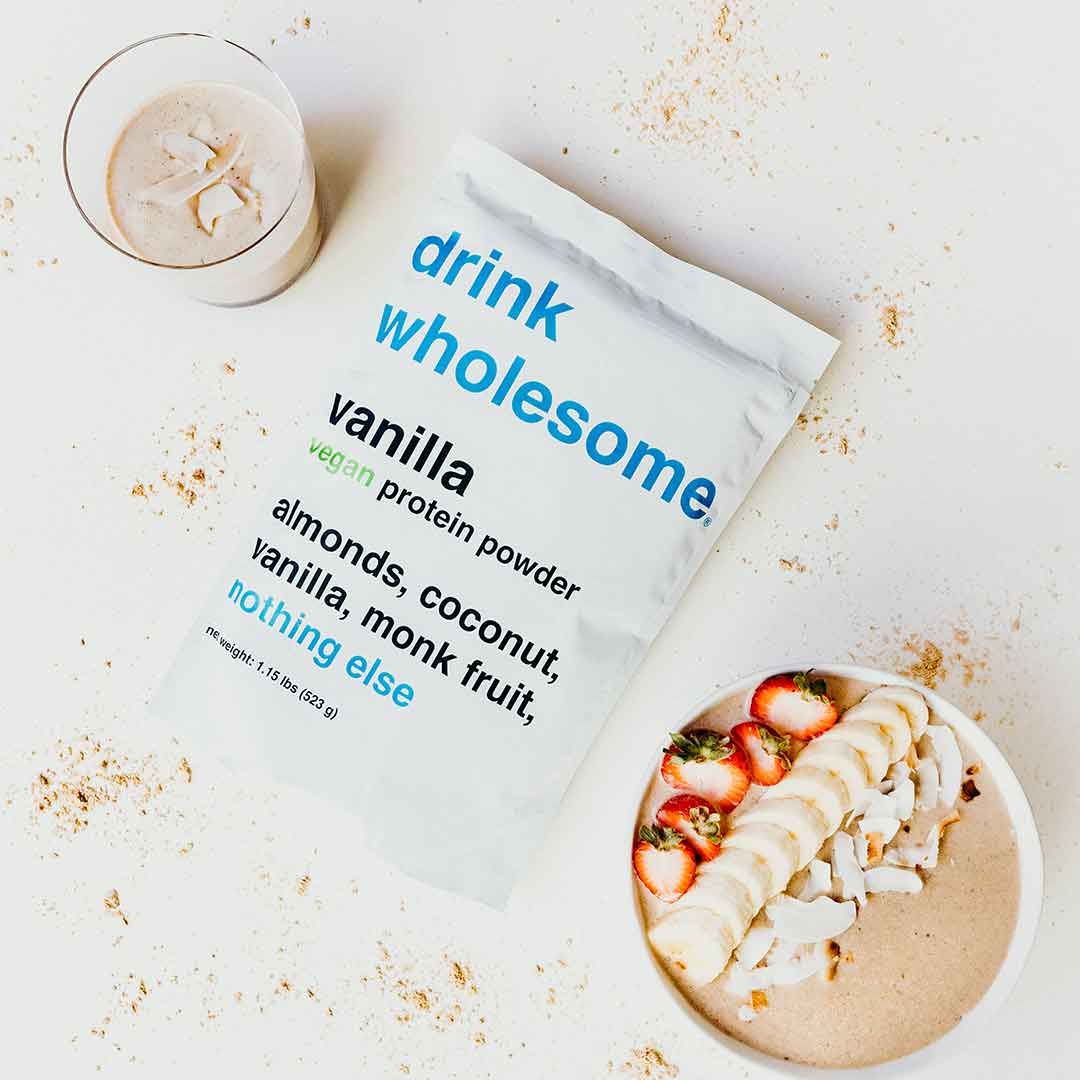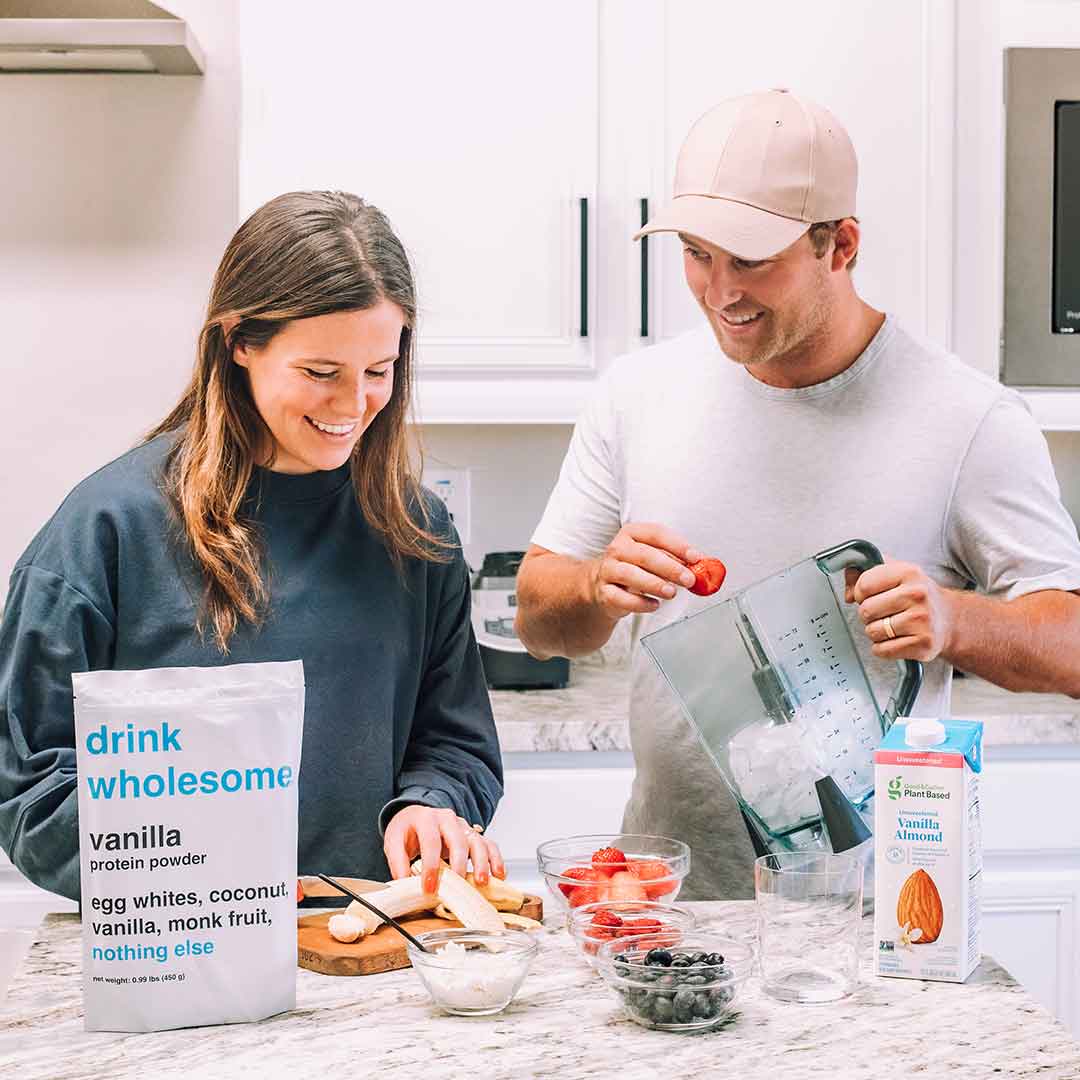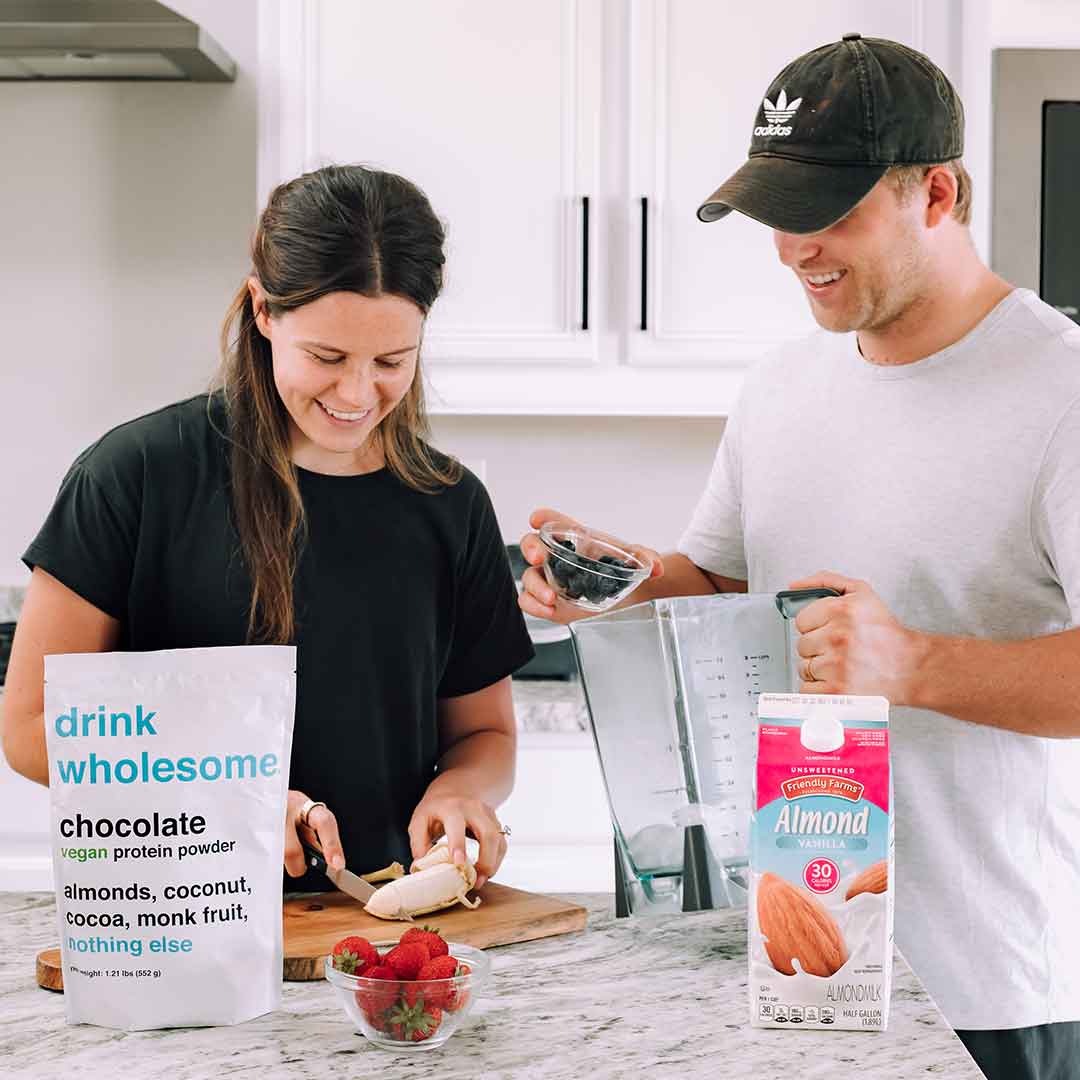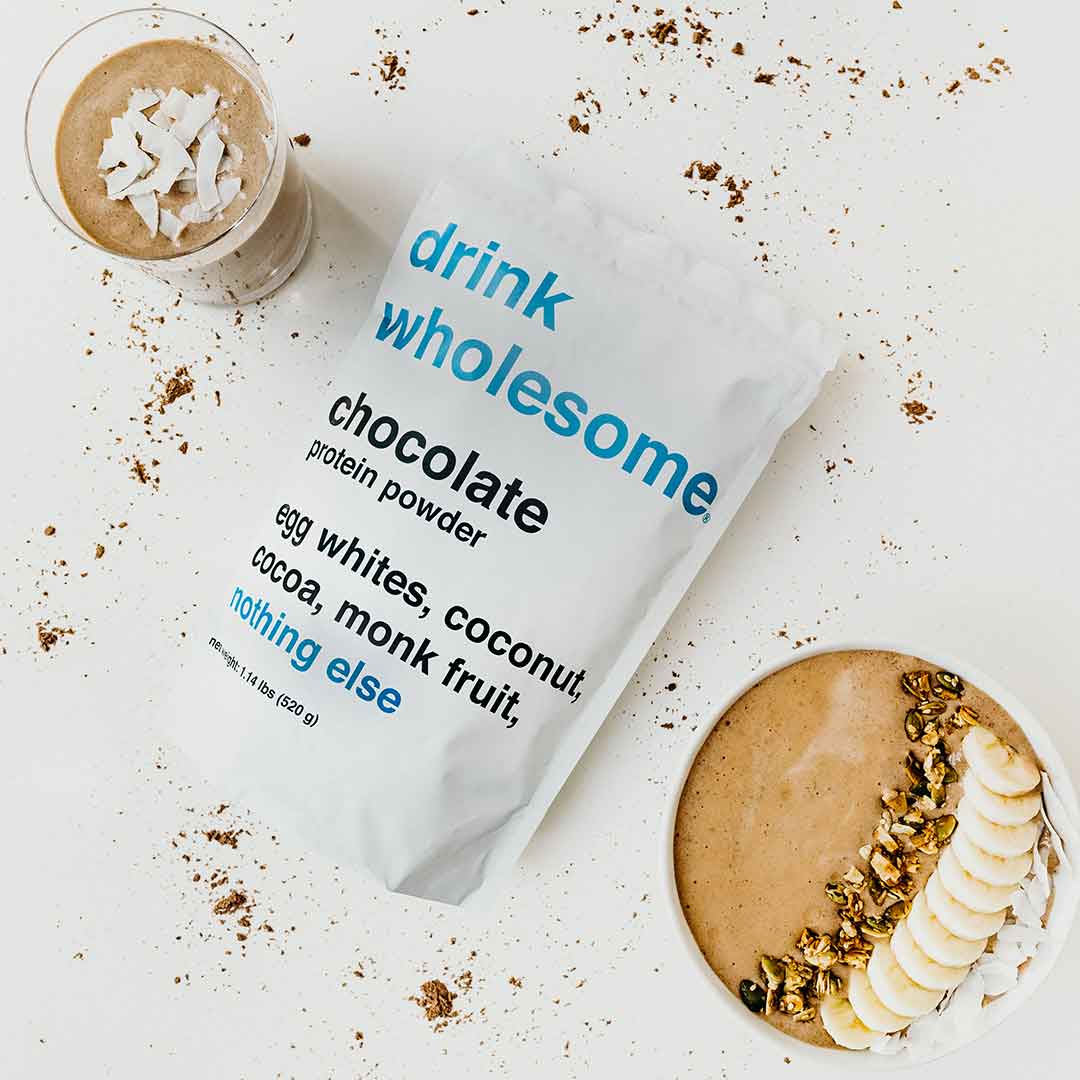Should I drink a protein shake before bed?
Written by Jack Schrupp and reviewed by Ella McGonagle, M.S. Nutrition
Should you drink a protein shake before bed? Learn more about when to drink protein shakes to achieve your wellness goals.
★★★★★
“It has ingredients you can actually pronounce and is freaking delicious.”
-Kallie
Protein Powder Sample Packs
The pros and cons of drinking a protein shake before bed.
What is nutrient timing?
Can I drink a protein shake before bed?
Why drink wholesome?
What is nutrient timing?
Nutrient timing refers to eating specific nutrients in specific amounts at specific times. Consuming protein right before going to bed is an example of nutrient timing. As you may have guessed, some people believe that nutrient timing has a significant impact on performance, recovery, etc.
The post-exercise “window” is widely considered the most important aspect of nutrient timing. It is thought that consuming the right nutrients in the right amounts after a workout can maximize post-exercise muscular adaptations. In other words, if you eat enough carbohydrates and protein after a workout, you will see the best results. This suggests that the best time to drink a protein shake is after a workout, not right before bed. Upon reviewing existing literature, however, it seems that nutrient timing is not particularly important for most people. This means that when you drink a protein shake does not really matter if you are simply trying to look and/or feel better.
Is it ok to drink protein shake before bed?
Is it bad to drink protein shakes at night? Nighttime eating, particularly before bed, has received a lot of attention in recent years. As a rule of thumb, you should stop eating about three hours before going to bed. This allows time for your body to digest the food, but also keeps you from going to sleep hungry. Digestion is important because researchers have found that undigested food can cause nocturnal awakenings and poor sleep quality.
Limiting and/or avoiding eating before nighttime sleep has also been proposed as both a weight loss strategy because negative outcomes have been observed in populations that consume a majority of their daily food at night. That said, research is beginning to show that negative outcomes are not consistent when the food choice is low calorie, nutrient-dense, and primarily one macronutrient. A protein shake before bed may therefore not be unhealthy, and could even promote positive physiological changes in healthy populations.
Research also shows that drinking protein shakes before bed is a great way to increase muscle protein synthesis rates during nighttime sleep. In other words, drinking a protein shake right before going to sleep will help you build more muscle and recover faster from resistance-type exercise training. That said, it is unclear if the benefits of this routine are due to nutrient timing or just increased protein intake. This all leads me to believe that as long as it does not upset your stomach, drinking a protein shake before bed is a good idea if you need the protein. That said, not protein supplements are created equal.
There are two types of protein shakes: ready-to-drink (store-bought) protein shakes, and protein shakes made with protein powder. In order to make protein shakes with protein powder, you have to mix the powder with milk or water. This requires a blender or a shaker bottle, and a little extra time and effort. Some people prefer ready-to-drink protein shakes because they are more convenient, but if they knew what they were drinking, they would probably vomit.
Ready-to-drink protein shakes are full of emulsifiers, stabilizers, thickeners, sweeteners, and flavors. Ingredients like these improve characteristics like taste, texture, and shelf stability, but can cause uncomfortable side effects and long-term gut damage (more about this soon). This is why I recommend that you make your own protein shakes with protein powder. That said, not all protein powders are created equal, and many contain the same additives found in ready-to-drink protein shakes!
Why drink wholesome?
drink wholesome is additive-free.
One of the reasons why we make the best protein powder is that we do not use food additives. Most protein powders, on the other hand, are full of food additives. Although not necessarily bad for you in small quantities, additives can add up quickly (especially if you drink a protein shake every day) and cause gastrointestinal (GI) side effects like bloating, constipation, diarrhea, gas, and stomach pain. This is because food additives are hard to digest, and sit in your gut for longer than food should, which gives your gut bacteria more time to eat. As they eat, these bacteria produce gas, which causes bloating and stomach pain. Gas also slows colonic transit (the amount of time it takes food to travel through the colon), and can lead to constipation. In the long term, food additives can disrupt regulatory pathways in the intestine, which can result in the development of inflammatory bowel disease (IBD) and systemic inflammatory disorders.
When buying protein powder, one ingredient to avoid in particular is artificial sweeteners. Artificial sweeteners are among the most harmful food additives in the long term as they alter the composition of your gut microbiota (the collection of microorganisms that help you digest food). This can lead to serious, chronic GI problems, widespread inflammation, and permanent damage to the gut microbiome. Some sweeteners, especially sugar alcohols like xylitol, are also poorly absorbed by the gut (meaning they feed those hungry gut bacteria), and cause diarrhea because they draw water into your intestine. Now you finally have something to blame for those post-protein shake trips to the bathroom!
Here is a list of the most common food additives in protein powder:
acacia gum, acesulfame potassium, artificial flavors, aspartame, carrageenan, cellulose gum, dextrin, dextrose, erythritol, gellan gum, guar gum, gum arabic, inulin, locust bean gum, “natural” flavors, maltodextrin, rice syrup solids, soy lecithin, silica, sucralose, sunflower lecithin, xanthan gum, xylitol
When it comes to identifying food additives, go with your gut. 😉 As a rule of thumb, they are the ingredients that you cannot pronounce. Food additives are not the only thing to look out for when buying protein powder, however. There are several other ingredients that can upset your stomach.
the alternative:
Protein Matrix Comprised of (Whey Protein Concentrate, Whey Protein Isolate, Calcium Caseinate, Micellar Casein, Milk Protein Isolate, Egg Albumen, Glutamine Peptides), Polydextrose, Sunflower Creamer (Sunflower Oil, Corn Syrup Solids, Sodium Caseinate, Mono- and Diglycerides, Dipotassium Phosphate, Tricalcium Phosphate, Soy Lecithin, Tocopherols), Natural and Artificial Flavor, MCT Powder (Medium Chain Triglycerides, Nonfat Dry Milk, Disodium Phosphate, Silicon Dioxide), Lecithin, Cellulose Gum, Salt, Yellow 5, Sucralose, Acesulfame Potassium, Papain, Bromelain.
*This is the actual ingredient list of one of the best-selling protein powders in the United States.
drink wholesome is dairy-free.
Another reason why we make the best protein powder is that we do not use dairy-based proteins. Many protein powders are made with whey and casein, which are byproducts of cheese and yogurt production, and known to cause digestive issues, especially for people with lactose intolerance and irritable bowel syndrome (IBS). Over one in three Americans are lactose intolerant, and the prevalence of IBS is somewhere between 10 and 15 percent in the United States. It follows that you may be lactose intolerant or have IBS and not even know it. Irritable bowel syndrome (IBS) is a poorly understood condition, and it is unclear why dairy triggers symptoms. Lactose intolerance, on the other hand, is clearly understood. People with lactose intolerance are unable to fully digest lactose, the sugar in dairy. As you just learned, partially digested food feeds the bacteria in your gut, which produce gas and cause stomach pain.
drink wholesome is made with real foods.
A final reason why we make the best protein powder is that we do not use protein isolates. Most protein powders, on the contrary, are made with protein concentrates and/or isolates, foods stripped of everything but the protein. They are listed on the ingredient list as “collagen protein,” “pea protein, and” “whey protein” as opposed to “collagen,” “peas,” and “whey.” I will not go into the details, but protein concentrates and isolates undergo heavy mechanical and chemical processing before becoming protein powder. Sometimes, manufacturers use chemical solvents like hexane to isolate (separate) the protein from the food. This means that what you end up putting into your body looks nothing like real food.
If you think about it, your gut was designed to digest naturally occurring foods, not laboratory formulated imitations, so if you feed it anything but real food, it might get upset. The long term implications of eating processed foods are still not well understood, but more and more research is finding that it can alter the composition of your gut microbiota, and lead to permanent damage to the gut microbiome. It is therefore in your best interest to avoid protein powders made with protein concentrates and isolates.
Instead of protein concentrates or isolates, we make the best protein powder with egg whites and almonds. Egg whites are simply pasteurized and dried before becoming protein powder. Almonds are just roasted, pressed, and ground. Minimally-processed ingredients like these are an easy to digest, gut-friendly alternative to protein concentrates and isolates. Unless you have a sensitivity or allergy to eggs, egg white protein is the best protein for your gut. Egg whites are low in fiber, low-FODMAP, naturally alkaline, and have the highest protein digestibility-corrected amino acid score (PDCAAS) of any whole food. Our customers have experienced fewer digestive issues with egg white protein than with any other type of protein. If you cannot eat eggs, try our almond protein powder. Unlike protein concentrates or isolates, almonds contain lots of healthy fats, fiber, and other nutrients like calcium and vitamin E. We prefer almonds to other minimally-processed plant protein sources because they are more gut-friendly. Research suggests that almonds possess prebiotic properties and can improve the diversity and composition of the gut microbiome.
★★★★★
“I’ve had Crohn’s disease for 20+ years and it’s always been hard to find a protein powder my stomach can handle. I’ve had no problem digesting drink wholesome AND it tastes great. I highly recommend this protein powder if you have IBS or Crohn’s.” – Jesse
Read more reviews or take the quiz.
It is ok to drink a protein shake before bed.
Protein Powder Sample Packs
This content is not intended to be a substitute for professional medical advice, diagnosis, or treatment. drink wholesome is not intended to diagnose, treat, cure or prevent any disease.


